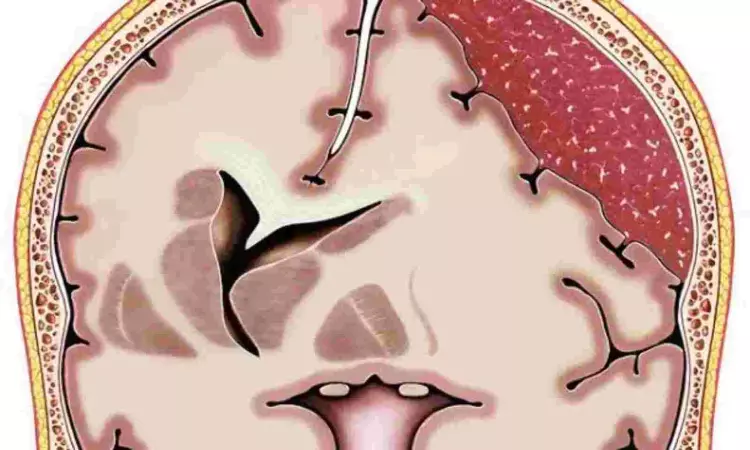- Home
- Medical news & Guidelines
- Anesthesiology
- Cardiology and CTVS
- Critical Care
- Dentistry
- Dermatology
- Diabetes and Endocrinology
- ENT
- Gastroenterology
- Medicine
- Nephrology
- Neurology
- Obstretics-Gynaecology
- Oncology
- Ophthalmology
- Orthopaedics
- Pediatrics-Neonatology
- Psychiatry
- Pulmonology
- Radiology
- Surgery
- Urology
- Laboratory Medicine
- Diet
- Nursing
- Paramedical
- Physiotherapy
- Health news
- Fact Check
- Bone Health Fact Check
- Brain Health Fact Check
- Cancer Related Fact Check
- Child Care Fact Check
- Dental and oral health fact check
- Diabetes and metabolic health fact check
- Diet and Nutrition Fact Check
- Eye and ENT Care Fact Check
- Fitness fact check
- Gut health fact check
- Heart health fact check
- Kidney health fact check
- Medical education fact check
- Men's health fact check
- Respiratory fact check
- Skin and hair care fact check
- Vaccine and Immunization fact check
- Women's health fact check
- AYUSH
- State News
- Andaman and Nicobar Islands
- Andhra Pradesh
- Arunachal Pradesh
- Assam
- Bihar
- Chandigarh
- Chattisgarh
- Dadra and Nagar Haveli
- Daman and Diu
- Delhi
- Goa
- Gujarat
- Haryana
- Himachal Pradesh
- Jammu & Kashmir
- Jharkhand
- Karnataka
- Kerala
- Ladakh
- Lakshadweep
- Madhya Pradesh
- Maharashtra
- Manipur
- Meghalaya
- Mizoram
- Nagaland
- Odisha
- Puducherry
- Punjab
- Rajasthan
- Sikkim
- Tamil Nadu
- Telangana
- Tripura
- Uttar Pradesh
- Uttrakhand
- West Bengal
- Medical Education
- Industry
Surgery or glucocorticoid treatment-which is better for chronic subdural hematoma?

Netherlands: Findings from the DECSA trial have shown that dexamethasone treatment is not noninferior to burr-hole drainage for functional outcomes in patients with a chronic subdural hematoma. Dexamethasone treatment had a greater risk of later surgery and more complications.
"The trial was not designed to test the superiority of either approach, but most results numerically favoured surgery," the team wrote in their study published in the New England Journal of Medicine.
The data and safety monitoring board terminated the trial early due to safety and outcome concerns in the dexamethasone group.
There is no clarity on the role of glucocorticoids without surgical evacuation for treating chronic subdural hematoma. Considering this, Ishita P. Miah, Department of Neurology, Amphia Hospital, the Netherlands, and colleagues conducted a multicenter, open-label, controlled, noninferiority trial, including patients with symptomatic patients with chronic subdural hematoma. They were assigned in the ratio of 1:1 ratio to a 19-day tapering course of dexamethasone or burr-hole drainage.
The primary endpoint was the functional outcome three months following randomization, evaluated by the score on the modified Rankin scale with a range of 0 (no symptoms) to 6 (death). Noninferiority was defined as a better functional outcome with dexamethasone than with surgery of 0.9 or more. Secondary endpoints were scores on the Extended Glasgow Outcome Scale and the Markwalder Grading Scale of symptom severity.
The researchers enrolled 252 patients of a planned sample size of 420 from 2016 to 2021; 127 were assigned to the dexamethasone group and 125 to the surgery group. The mean age of the patients was 74 years, and 77% were men.
The study revealed the following findings:
- The adjusted common odds ratio for a lower (better) score on the modified Rankin scale at three months with dexamethasone than with surgery was 0.55, which failed to show the noninferiority of dexamethasone.
- The scores on the Markwalder Grading Scale and Extended Glasgow Outcome Scale generally supported the primary analysis results.
- Complications occurred in 59% of the patients in the dexamethasone group and 32% of those in the surgery group, and additional surgery was performed in 55% and 6%, respectively.
"In a trial involving patients with chronic subdural hematoma that was stopped early, dexamethasone treatment was not found to be noninferior to burr-hole drainage for functional outcomes," the researchers wrote. "The treatment with dexamethasone was associated with more complications and a greater likelihood of later surgery."
Reference:
New England Journal of Medicine. Miah IP, et al "Dexamethasone versus surgery for chronic subdural hematoma" N Engl J Med 2023; DOI: 10.1056/NEJMoa2216767.
Dr Kamal Kant Kohli-MBBS, DTCD- a chest specialist with more than 30 years of practice and a flair for writing clinical articles, Dr Kamal Kant Kohli joined Medical Dialogues as a Chief Editor of Medical News. Besides writing articles, as an editor, he proofreads and verifies all the medical content published on Medical Dialogues including those coming from journals, studies,medical conferences,guidelines etc. Email: drkohli@medicaldialogues.in. Contact no. 011-43720751


